July 17, 2015
Water Lessons at Citizen Scientist Camp
Campers spend a week creating solutions to the watershed pollution problem.
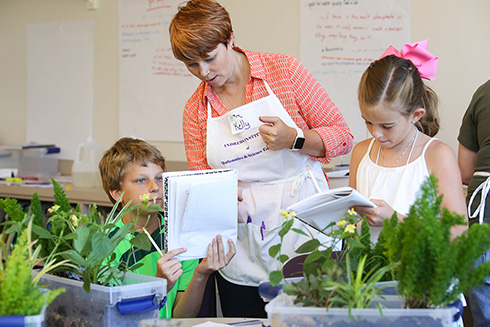
Kelly Feille answers questions about rain gardens and water testing at Citizen Scientists camp. (Photo by Amy Peterson)
July 17, 2015
Water Lessons at Citizen Scientist Camp
Campers spend a week creating solutions to the watershed pollution problem.
In the middle of summer camp, elementary school students scrutinize dirt-specked water as it seeps out of rain gardens in plastic containers. Holding up a tube containing fuchsia water to show her instructor, 11-year-old Aimee Ebeling wears a solemn expression, conveying the presence of both pollution and a problem.
Learning science is an experiential process, something young students need to get their hands dirty and do. As doctoral candidates in science education at TCU, Kelly Feille ’14 and Jenesta Nettles grappled with the challenge: how could they help cultivate a lifelong fascination with the power of science?
As an answer, they established the Citizen Scientists summer camp in partnership with TCU’s Andrews Institute of Mathematics and Science Education. Last summer, they hosted a free one-week camp. Participants journeyed to a creek near campus to measure water pollution levels.
This summer, the women offered two sessions for kids entering grades three through seven. In week one, campers learned about watershed systems and measured the microscopic health of the Trinity River watershed.
In a separate week two, campers, including Aimee, are searching for a solution to water pollution problems. The 16 kids ranging in age from 9 to 12 each chose a combination of plants to add to a personal rain garden, a concoction of sand, gravel, dirt and organic material designed to collect water and absorb some of the chemical culprits of pollution.
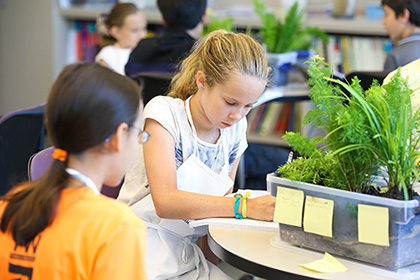
Aimee Ebeling (L) and Grace Lacina (R) add water measurements to data tables.
The students split into small teams. On Thursday, at a round table inside the spacious Potter Lab, Aimee measures out compost tea before Grace Lacina pours it into the rain garden she planted the day before.
Austin Johnson, at age 9 the team’s youngest member, keeps an eye on a timer as he shows off his own assortment of fern and lantana plants, half art project and half living filtration machine. Aimee and Austin are both returning participants from the first year, and both expressed an urgent need for people to be responsible and conserve water.
Austin’s mom Amy Johnson, a special education teacher with the Dallas Independent School District, observes the activity. She, Austin and a cousin rode the train to Fort Worth because Austin wanted to do a summer activity involving science or math. Inspired at an early age by the Captain Planet and the Planeteers cartoon, the boy’s interests include water conservation, recycling, and taking apart then reassembling household gadgets.
The big idea is they go out thinking about their impact and any differences they can make
Kelly Feille
Amy Johnson said she searched online for a STEM-themed camp that would welcome kids his age. Other than Feille and Nettles’ Citizen Scientists, she couldn’t find any. She said she appreciates the opportunity to keep her son engaged in inquiry before he starts the fourth grade. “The camp develops that love of science.”
Austin and his teammates use a water test kit to measure the pH, nitrate and phosphate levels in the compost tea dripping out of Grace’s rain garden. After Grace collects her data and enters it into a notebook, Austin moves his rain garden to be tested and selects water from Nettles’ fish tank as a variable.
The pre-garden measurements show the fish water swirling in plastic tubes to be high in nitrates — so high, in fact, that the clear water turns dark pink. The sample causes consternation among the kids.
Feille and Nettles want their students to understand the environmental implications of the pink test tube. “Too many nitrates and phosphates can cause algae blooms, which will suffocate all life in the water,” Feille said.
Austin and his team re-measure the water after it has traveled through his rain garden. The plants have filtered out some of the nitrates, showing the campers that rain gardens might be an effective solution to cleaning up creeks and other water bodies, which often contain high levels of pollutants.
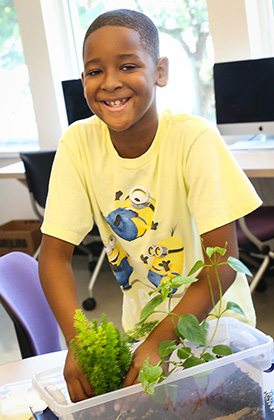
Austin Johnson, age 9, plants a rain garden in hopes of cleaning pollutants out of water.
Aimee volunteers to go next and test her garden with tap water. Last year, the 11-year-old leveraged the camp’s lessons to do a similar experiment for her elementary school’s science fair. She tested what temperature of water would carry the most chemicals out of a rain garden. She explained her results: cold water transported more pollutants than hot water. She then connected her experiment with common lawn fertilizers, which contain high levels of phosphates that can seep into the watershed.
“So it’s best to fertilize your lawn when there’s no expected rain,” which is typically cold, she said. “Actually, it’s best not to fertilize.”
Turning scientific observations into actionable insights was the founders’ intention. They wanted the camp to involve “something [kids] could act on in their everyday life, on their school grounds, in their houses, in their neighborhoods,” Feille said.
Johnson said her son spent the last year testing water around the house with the kit he took home from camp.
The concept of creating citizen scientists involves empowering people at a young age, convincing them that not only can they have fun conducting science experiments, but that their studies can be important for the future.
“The big idea is they go out thinking about their impact and any differences they can make,” Feille said. “It doesn’t take too much to realize how easy it is to clean up your water.”
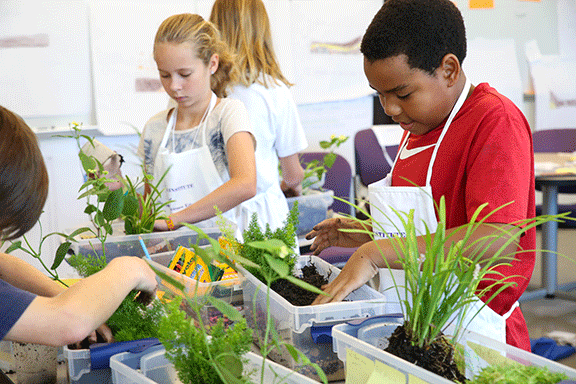
Each camper selected a unique assortment of plants.
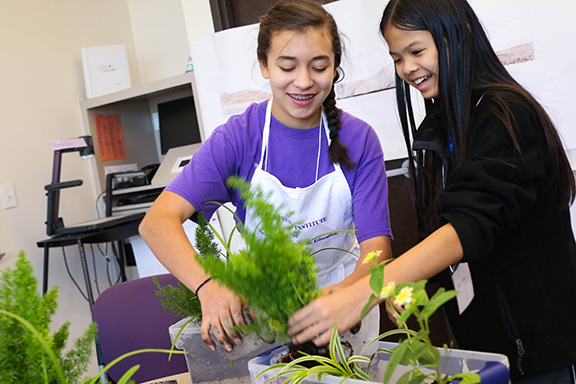
Six campers returned from year one.
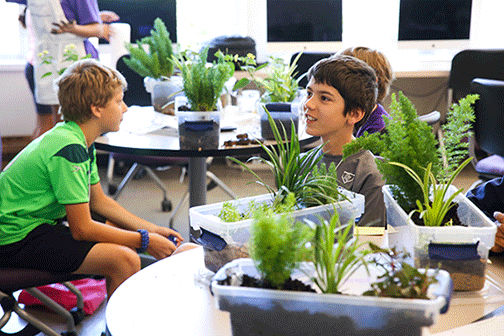
Camp directors hope students leave inspired to make an impact on water pollution problems.

Your comments are welcome
1 Comment
Related Reading:
Features
A Leader Among Leaders
Victor J. Boschini, Jr.’s two-plus decades as Chancellor have transformed a university and a community.
Latest News
Purple Atop the Podium
TCU Rifle has transformed into a perennial power under coach Karen Monez.